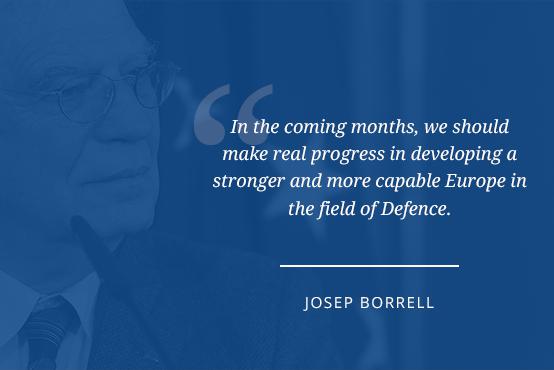Every day we see vivid proof of the need for the EU to step up its game and take greater responsibility for its security. We have multiple crises burning in our neighbourhood and further afield. Crises that cannot be addressed by one Member State alone but require consolidated, joint action. If we do not act, others will and not always in a way that corresponds to our interests. If we want diplomacy to succeed – and we certainly do – it must be backed by action. And for this we need both the will and the means to do, including defence means.
This is why the debate I had this week with my colleagues in the Commission on the future of European defence was so important.
The good news is that we do have a policy framework on which to build, as well as structures and expertise, starting from the European Defence Agency and the European External Action Service. While the origins of the EU Common Security and Defence Policy go back to the early 2000s, EU defence efforts have gained new momentum in recent years, with the development of important new instruments and initiatives to boost our defence capacities.
With PESCO (Permanent Structured Cooperation), we have created a unique framework for Member States to work together to boost cooperation in concrete areas, such as upgrading maritime surveillance systems or joint training or developing the next generation of attack helicopters. So far, 47 projects have been launched. We have set up a mechanism – the Coordinated Annual Review on Defence – that helps Member States identify opportunities for new collaborative projects. We have strengthened command structures at Headquarters to plan and conduct military missions. We have proposed a European Peace Facility that will improve financing of EU military operations and defence-related assistance to our partners.
Read also
In all this, we should remember that the real action is not in Brussels but in the field. We have currently 17 civilian and military missions and operations with around 5000 women and men taking action for peace.
Defence remains a national competence of our Member States and hence most European defence cooperation is intergovernmental. Without Member States’ full commitment, we will not be able to advance. At the same time, in the last years it has become clear that the European Commission can bring valuable contributions to the table. For example, the future European Defence Fund under the next EU Budget, will offer financial incentives to support cooperation among European defence industry to develop much-needed capabilities in a collaborative manner. It can offer financial support to upgrade infrastructure across Europe, to facilitate the mobility of troops and equipment. Also, there is huge potential for synergies between defence and other EU policies in critical domains, such as space, cyber and Artificial Intelligence, or the link between climate change and security, where the Commission plays an important role.
Defence is clearly a ‘growth area’ for the EU. That is why we need everyone who has a stake in the future of European defence – across the EU Institutions and Member States – to pull in the same direction. To succeed, we must all strive for the same strategic goal: a more capable Europe in the field of defence. The role of the High Representative, being also Vice President of the Commission and Head of the European Defence Agency was created precisely to ensure coherence and a common direction for European defence.
The idea of a ‘Strategic Compass’ – now under discussion – is meant to better define, together with Member States, this direction.
Clearly, EU-NATO cooperation is part of the equation. A stronger Europe makes NATO stronger and vice-versa. This is precisely the message I passed when attending this week the NATO Defence Ministerial. The EU and NATO are the two sides of the same coin. The Transatlantic community must stay together – and in so doing send a powerful message to friends, partners and foes alike.
This weekend the Munich security conference will feature many discussions on how Transatlantic partners, with others, can address pressing security challenges.
In that debate, the voice of Europe needs to be strong and self-confident. But we can only play a prominent role in safeguarding our security – as we must – if we have the capacities we need and will to use them.
That’s the reason why in the coming months and years, we should make real progress in developing a stronger and more capable Europe in the field of defence. It is a crucial part of giving substance to our stated goal of becoming a geostrategic actor.
European Union























































